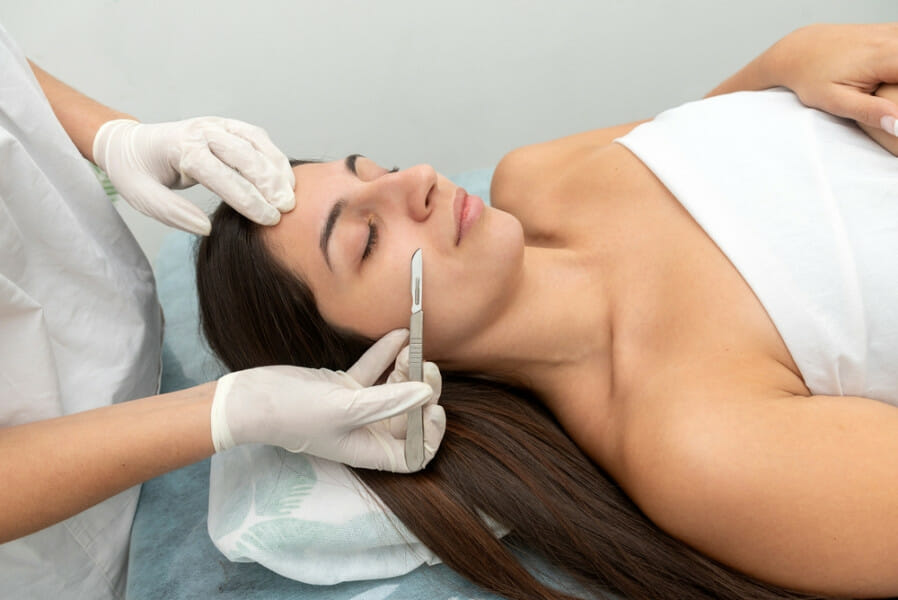Is Dermaplaning Good For Your Face?
Dermaplaning has gained popularity recently as a non-invasive skincare treatment that promises to improve your skin’s appearance. But what exactly is dermaplaning, and is it good for your face? These questions are relevant when searching for a med spa in Rochester, MN, or anywhere else.
In this blog post, we’ll dive into this treatment’s details, benefits, and potential drawbacks.
What Is Dermaplaning?
Dermaplaning is a cosmetic procedure that involves using a sterile surgical scalpel to gently scrape off the top layer of dead skin cells and vellus hair (also known as peach fuzz) from the face. The process is similar to shaving but is performed on a dry face and requires a skilled practitioner to safely and effectively remove the outer layer of skin.
The procedure is typically performed in a clinical setting, such as a dermatologist’s office or a med spa. Depending on the treated area, it can take anywhere from 30 to 90 minutes. After the procedure, patients can expect their skin to feel smoother, brighter, and even-toned.
How Is Dermaplaning Good For Your Face?
Dermplaning offers several benefits to help the skin on your face, including:
Exfoliation
The dermaplaning blade is an exfoliant that skims the dead skin cells off your face. A professional med spa practitioner will thoroughly exfoliate your skin and help avoid cuts and irritation. You will see an improvement in your skin’s overall tone and texture.
Smoothness
Removing your vellus hair makes your skin smoother. This smoother texture will look and feel better while making all aspects of skincare easier. Most people consider dermaplaning with smoother skin as their top priority.
Product absorption
If you’re noticing your skincare products haven’t been working as they used to, it may be because of the vellus hair on your face. Dermaplaning removes this peach fuzz and allows skincare products to penetrate more deeply into the skin, potentially improving product takeup.
Makeup application
A smoother face allows you to apply makeup more effectively. Without vellus hair, you can apply makeup more evenly and could even save money by using less makeup overall.
How Is Dermaplaning Bad For Your Face?
The dermaplaning process, when done correctly, does not harm your skin. The idea that this procedure could inherently cause long-term skin damage is mostly a myth, as dermaplaning is generally considered a safe cosmetic procedure. However, there are some risks to keep in mind. Dermaplaning can lead to infection and skin discoloration in some cases. It can also cause scarring, including hypertrophic or raised scars.
Again, best-practice dermaplaning is safe for your face. As with any medical or cosmetic procedure, there are inherent risks, but they are few and far between when the treatment is done correctly.
Yes, Dermaplaning Is Good For Your Face
No procedure comes without risks, but rest assured that dermaplaning is good for your face when done by a qualified medical professional. Before undergoing dermaplaning, it’s essential to consult with a trained practitioner to determine if it’s the right treatment for your skin type and condition. You could be well on your way to smoother, younger-looking skin. Med spas offer the procedure all over the country, including dermaplaning near you.
!function(f,b,e,v,n,t,s){if(f.fbq)return;n=f.fbq=function(){n.callMethod?
n.callMethod.apply(n,arguments):n.queue.push(arguments)};if(!f._fbq)f._fbq=n;
n.push=n;n.loaded=!0;n.version=’2.0′;n.queue=[];t=b.createElement(e);t.async=!0;
t.src=v;s=b.getElementsByTagName(e)[0];s.parentNode.insertBefore(t,s)}(window,
document,’script’,’//connect.facebook.net/en_US/fbevents.js’);
fbq(‘init’, ‘1659360370986360’);
fbq(‘track’, “PageView”);(function(d, s, id) {
var js, fjs = d.getElementsByTagName(s)[0];
if (d.getElementById(id)) return;
js = d.createElement(s); js.id = id;
js.src = “//connect.facebook.net/en_GB/sdk.js#xfbml=1&appId=1042187652488583&version=v2.3”;
fjs.parentNode.insertBefore(js, fjs);
}(document, ‘script’, ‘facebook-jssdk’));(function(d, s, id) {
var js, fjs = d.getElementsByTagName(s)[0];
if (d.getElementById(id)) return;
js = d.createElement(s); js.id = id;
js.src = “//connect.facebook.net/en_US/sdk.js#xfbml=1&version=v2.4&appId=221591494559091”;
fjs.parentNode.insertBefore(js, fjs);
}(document, ‘script’, ‘facebook-jssdk’));
















